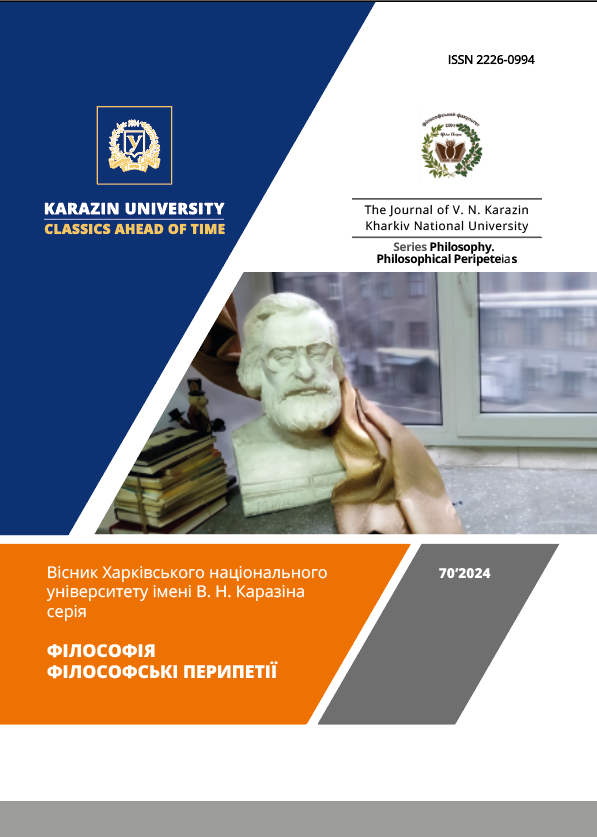DIGITAL MODERN: A PHILOSOPHICAL PERSPECTIVE ON URBANISM AND DIGITAL HUMANITIES
Abstract
The article offers a philosophical reflection on the digital reality, digital urbanism, and digital humanities, posing fundamental questions about the nature of these phenomena and their potential risks. Shedding light on aspects of digital urbanism, researchers explore how technological transformations impact the structure, organization, and transformation of living spaces. In the context of digital humanities, the influence of new technologies on humanistic disciplines and ethical aspects is evaluated. Philosophical reflection on the impact of the digital environment on cultural and social aspects of urban life allows for the consideration of the importance of open data and collective knowledge exchange in the digital era. The article proposes an integrative view of digital modernity, emphasizing the relevance of a phenomenological perspective on understanding the complex relationships between humans and technologies in the contemporary world. The research identifies the influence of digital transformation on human existence, raising concerns about the possible loss of human identity in the conditions of the new reality. However, the article offers a new perspective on the issue, emphasizing that it is not the flexibility but the plasticity of human consciousness that could be the key to rethinking the digital age. The authors argue that the plasticity of human thinking can provide humanity not only with a means of adaptation but also with a new source of creativity. As a result, it is concluded that despite the challenges of digital reality, the plasticity of consciousness could become the foundation for creating new, exciting perspectives. The authors see this transition as an opportunity to form a more harmonious interaction between humans and the digital environment and to create unique realities. Thus, the article challenges stereotypes about human vulnerability in the digital age, asserting that the plasticity of human consciousness can open new horizons for creative interaction with the changing world.
Downloads
References
Heath, C., Mormina, M. (2022). Moving from Collaboration to Co-production in International Research. Eur J Dev Res 34, 1704–1715. URL : https://doi.org/10.1057/s41287-022-00552-y
Handbook of Visual Communication: Theory, Methods, and Media. (2020). Еdit. by Kenneth L. Smith, Sandra Moriarty, Keith Kenney, Gretchen Barbatsis. New York: Routledge. URL : https://books.google.fi/books?id=ikmM_irMjKUC&printsec=frontcover&hl=fi#v=onepage&q&f=false
Heidegger, M. (2000). Die Frage nach der Technik. Gesamtausgabe. Vol. 7.
Malabou, C. (2022). Plasticity: The Promise of Explosion. Edinburgh: Edinburgh University Press. URL : https://edinburghuniversitypress.com/book-plasticity.html
Ortega y Gasset, J. (1961). What is Philosophy? New York: Norton.
Perchyk, A. (2023). Low-Hanging Web Performance Fruits: A Cheat Sheet. [Electronic resource]. URL : https://betterprogramming.pub/low-hanging-web-performance-fruits-a-cheat-sheet-3aa1d338b6c1
Simmel, G. (1995). Die Großstädte und das Geistesleben. Herausgegeben von Rüdiger Kramme, Angela Rammstedt und Otthein Rammstedt. ss. 116–131. Frankfurt am Main: Suhrkamp.
Spengler, O. (1931). Der Mensch und die Technik. München: C. H. Beck.
The Cambridge Digital Humanities Network. [Electronic resource]. URL : www.digitalhumanities.cam.ac.uk.
Wyatt S., Millen D. (2014). Meaning and Perspectives in the Digital Humanities. A White Paper for the establishment of a Center for Humanities and Technology (CHAT). Koninklijke Nederlandse Akademie van Wetenschappen (KNAW). URL : https://pure.knaw.nl/portal/files/894428/white_paper_ web_ 1_.pdf
Copyright (c) 2024 Наталія Попова , Артем Перчик , Микита Мязін , Сергій Беднарський

This work is licensed under a Creative Commons Attribution 4.0 International License.
Authors who publish with this journal agree to the following terms:
- Authors retain copyright and grant the journal right of first publication of this work under the terms of a license Creative Commons Attribution License 4.0 International (CC BY 4.0).
- Authors are able to enter into separate, additional contractual arrangements for the non-exclusive distribution of the journal's published version of the work (e.g., post it to an institutional repository or publish it in a book), with an acknowledgement of its initial publication in this journal.
- Authors are permitted and encouraged to post their work online (e.g., in institutional repositories or on their website) prior to and during the submission process, as it can lead to productive exchanges, as well as earlier and greater citation of published work.






3.gif)




